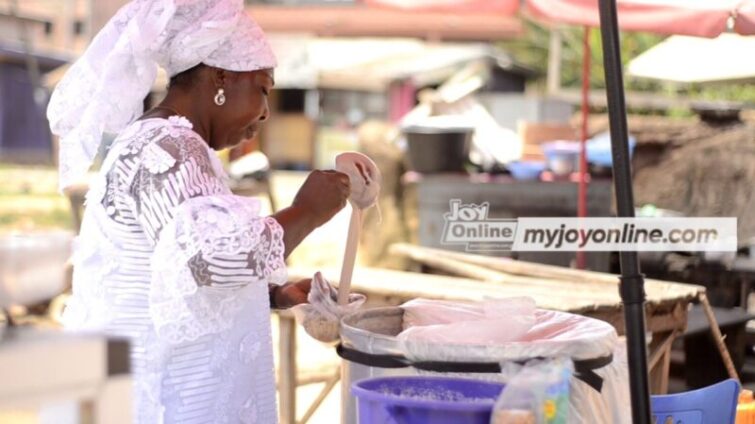Consumers of millet porridge, known popularly as ‘Hausa Koko’, are paying more to have a satisfying breakfast, as the cost of the main production ingredient - millet – surges.
Vendors say it costs a minimum of GHs15 to purchase the porridge with other accompaniments like milk, peanuts and bean fritters or koose.
Luv Business explored the rising cost of the millet which is also impacting the sale of Brukina in the Ashanti regional capital, Kumasi.

“This koko together with milk and ground is 8 cedis,” Alima Sadia, a Hausa koko vendor, told the news team as she serves her customer at Bomso, a suburb of the Oforikrom municipality.
Millet porridge or Hausa Koko is one of the favorite and accessible breakfast dishes for many Ghanaians.
Made from a mixture of grounded millet and other local spices, the porridge is usually enjoyed with other pastries, like koose.
But what was once the cheapest breakfast meal on the Ghanaian menu is now an expensive luxury.
Alimatu Sadia has been in the business for the past two decades.
“At first we used to package the koko with fritters at 10 cedis but now it’s selling at 15 cedis. That’s how much you pay to get a satisfying meal,” she said.
Millet is a household grain used for many delicacies in Ghana, especially in the Northern part.
Its gritty texture adds a satisfying feel when processed into Brukina, a local millet and milk smoothie.
But the snack is also seeing an astronomical rise.

“These used to sell at 3, 4 and 7 cedis. But because the price of millet has shot up, they are selling at 10 cedis and 5 cedis. We no longer sell 3 cedis,” Gifty, a Brukina vendor at Ayigya, said.
The increasing cost of the meals is attributable to the price surge and scarcity of its major ingredients, millet and beans.
The price of the commodity on the market is seeing a 120% surge from 500 cedis to 1,200 cedis.
Hajia Munira explains the increasing costs.
“Last year, a bag of millet sold at 500 cedis but now it is selling at 1,200 cedis. The exchange rate is our headache,” she said.
The millet is not the only increasing commodity, the beans used for the fritters added to the Hausa kokoare now shooting up.

Alhaji retails beans at the Alabar market. But his shop is almost empty after the trucks of beans he is transporting from neighbouring Burkina Faso and Niger were hijacked.
“Where we import from isn’t safe. We are sometimes held up at the checkpoints for days and when we return here most of commodities would be spoilt,” Alhaji recounted.
The cup of beans, locally measured as “Olonka” is selling at 65 cedis and a bag is now over 2,100 cedis.
Back at Alimatu's koko joint, some of her workers are leaving the job which serves as a daily source of income. She is no longer able to pay them an adequate wage.
“Most of my workers have left now. One of them has even packed up her stuff and ready to leave me,” she worriedly said.
Many vendors along the downstream of the value chain are anxious for respite from the skyrocketing prices
Latest Stories
-
Atarah Praise makes big statement at Adenta with 2025 edition
16 minutes -
Annoh Dompreh claims Wontumi is on hunger strike amidst EOCO detention
17 minutes -
DBG and AGI chart reform roadmap to reinvigorate Ghana’s textile and garment industry
23 minutes -
Prisons Service receives computers from Cyber1defense Communication Ltd
26 minutes -
DBG CEO outlines vision to transform Ghana’s textile sector
26 minutes -
World Vision International donates $30,000 worth of medical supplies to Agortime Ziope Health Directorate
29 minutes -
Karim Zito anticipates tough test against Medeama in final home game
31 minutes -
Ghana’s Washington DC embassy issues over 800 visas on Day 1 of reopening
36 minutes -
Grassroots dialogue key to resolving African conflicts – Baroness Foster
38 minutes -
A Smokeless Future for Ghana: Why World Vape Day 2025 marks a turning point in Tobacco harm reduction
40 minutes -
Abuakwa South MP rallies political and security forces to end environmental degradation
42 minutes -
Dada KD’s family pays courtesy call on MUSIGA to prepare for one-week observance
42 minutes -
Four police officers promoted for diligence and professionalism
45 minutes -
Abuakwa South MP takes strong action to protect the environment from illegal mining
51 minutes -
GHOSPA appeals for financial clearance to engage pharmacist house officers
53 minutes

